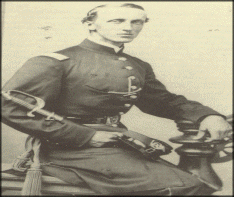|

William Francis Bartlett was born in Haverhill, Massachusetts, on June
6, 1840 and was a member of the class of 1862 at Harvard when the Civil
War broke out. He enlisted as a private the day Fort Sumter surrendered
and in August, 1861, became a captain of the 20th Massachusetts Infantry.
He lost a leg at Yorktown in the spring of 1862 during the Peninsular
campaign, but recovered sufficiently to be present with his class and
receive his degree in June of that year and to become colonel of the 49th
Massachusetts in November. The regiment was ordered to Louisiana with N.P.
Banks, and took part in the siege and capture of Fort Hudson in July,
1863, where Bartlett was twice wounded and thereafter compelled to be on
horseback at all times. He was a prime target for marksmen, though
Confederate officers reputedly told their men not to shoot at the
one-legged Yankee. At the outset of U.S. Grant's Overland campaign
Bartlett organized the 57th Massachusetts, which he led at the battle of
the Wilderness, sustaining still another wound. He was appointed Brigadier
General of volunteers on June 20, 1864 and at the battle of the Crater was
taken prisoner, his cork leg shattered with bullets. After several weeks
in Libby Prison, General Bartlett was exchanged and put in command of the
IX Corps, which he led with distinction until the end of hostilities. He
received the brevet of major general on March 13, 1865, for gallant and
meritorious services. Mustered out in July, 1865, he engaged for some time
in business with the government-owned Tredegar Iron Works in Richmond,
Virginia. Then he moved to Pittsfield, Massachusetts, the home of his
wife. He died there on December 17, 1876, and was buried in Pittsfield
Cemetery.
Source- Warner, Generals in Blue (LSU Press 1964)
|